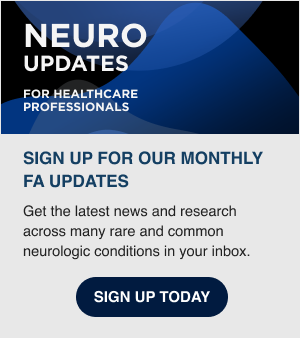Treating cardiac complications with Friedreich's ataxia
George Wilmot, MD, PhD, describes how he approaches monitoring and treating cardiac symptoms that appear in Friedreich’s ataxia patients.
About George Wilmot, MD, PhD
George Wilmot, MD, PhD, is a board-certified neurologist affiliated with several hospitals, including Emory University Hospital. He also serves as an associate professor at Emory University School of Medicine’s Department of Neurology and adjunct associate professor at the school’s Department of Pediatrics. He is an ataxia clinical researcher and he started the Cooperative Ataxia Registry.
Transcript
Well, I think that cardiac complications — number one, when patients are neurologically impaired, are putting less stress on their cardiovascular system. They’re not out running around as much. They might be in a wheelchair. Because of that, the symptomatic changes of heart failure, for instance, might be less obvious.
That just means there’s an increased reliance on following the disease with echocardiograms, for instance, to look at how the heart is functioning within a study rather than relying purely on symptoms.
There are symptoms of cardiac involvement like arrhythmias. Patients get, you know, the standard stuff of fatigue. Sometimes it can be very situational in a way that is a little hard to reconcile with it being the heart, but in Friedrich’s patients, that can be.
So I think mainly it’s a high index of suspicion if something doesn’t seem right from a cardiac standpoint to make sure that it’s investigated. And it’s never wrong in proven genetic cardiomyopathy to have that patient followed primarily from a heart standpoint by cardiology rather than just in primary care.
That being said, I think one of the questions is with routine yearly screening of cardiac function — EKG, echo — and there might be a slight decrease versus normal some evidence of abnormality, but maybe it is not progressing for many years, at that point, the cardiologist might want to step back from evaluating the patient because things look stable.
That’s probably fine to then be followed in primary care or maybe even by neurology. The general recommendation would be yearly cardiac evaluations, most typically with an echo and then sporadic when indicated by symptoms. I wonder personally whether in the more stable patients that could be extended a little bit. If you’ve had the disease for 15 or 20 years and it’s always been pretty stable, you can probably rely on a little less frequent evaluation.
Our FA medical advisor
 David Lynch, MD, PhD, is the director of the Friedreich’s Ataxia Program at Children’s Hospital of Philadelphia.
David Lynch, MD, PhD, is the director of the Friedreich’s Ataxia Program at Children’s Hospital of Philadelphia.

